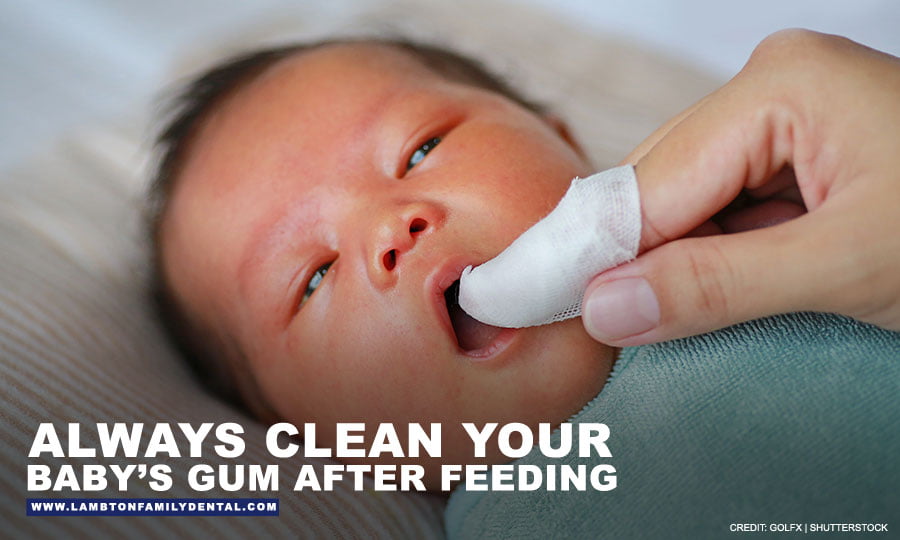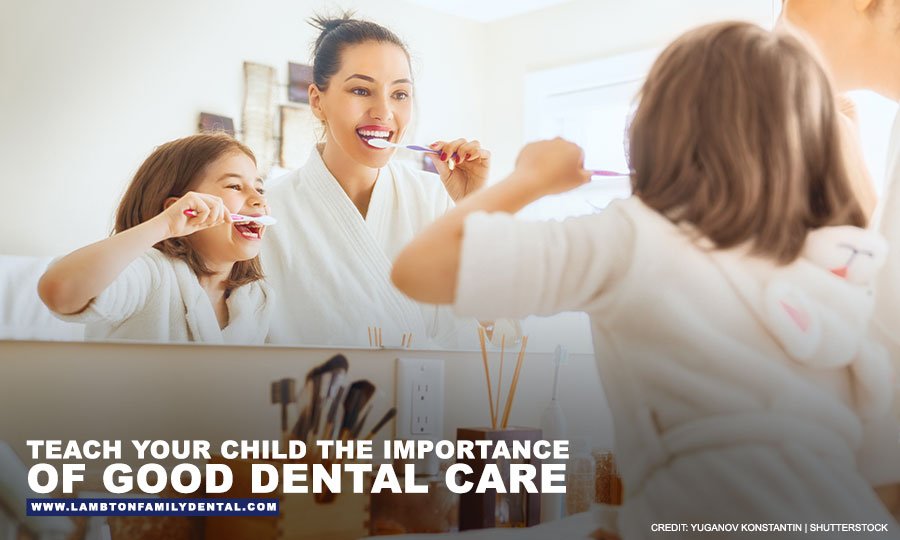Your children’s teeth play a crucial factor in their overall health. As a parent, it is your responsibility to establish strong oral care and help them set good dental habits as your child grows. Poor dental care can put your child at risk of tooth decay, gum disease, and other dental health issues.
As much as you want to keep your child’s teeth and gums healthy, it can be challenging to learn how much dental care they need, especially for infants. Knowing what to do to take care of their teeth and gums is the first step to helping them achieve good oral health.
Do Infants Need Oral Care?

Taking good care of our dental health is crucial, but what about baby teeth? Although not visible, your baby’s teeth have already developed inside their jaws at birth. Dentists say that proper dental care should start even before your baby’s first teeth come in.
- Birth to 6 Months of Age
Practicing healthy children’s dental health care is the first line of defense against potential tooth decay in infants and children.
- Make sure to always gently clean their gums after feeding. Wrap a moistened soft, clean washcloth around your index finger and gently massage the gum tissues.
- Teething usually starts between 4 to 6 months. You may notice red, swollen gums and increased flow of saliva in your baby. Giving your baby a cold, wet washcloth or a clean teething ring can help relieve the symptoms. You can also chill the teething rings as cold temperatures have a soothing effect on swollen gums.
- Since tooth decay is a transmissible dental problem, never use your mouth to test the bottle’s temperature and clean the bottle nipple or pacifier, as well as share utensils (especially spoons). These practices can transmit harmful bacteria to your infant’s mouth and cause tooth decay.
- 6 to 12 Months of Age
Dental care for your baby’s first teeth usually starts between 6 to 8 months of age. That is why it is critical for parents to start caring for their infant’s tooth from the month it comes out.
- Even if the first tooth has erupted, continue cleaning and massaging your baby’s gums after feeding. Use a soft-bristled toothbrush with no toothpaste to clean their teeth.
- Start weaning your baby from the feeding bottle and slowly introduce solid foods and have them drink from a cup. Eventually, babies aged 12 to 14 months will get used to drinking from a cup. Promote healthy habits by limiting sweetened beverages and feeding them nutritious foods.
- Always check your baby’s gums and teeth. Look for signs of small white or brown spots on their teeth as these may be early signs of tooth decay. Call a dentist to book a children’s dentistry appointment as soon as possible.
- Visit a children’s dental health clinic near you for their first dental appointment. Babies should have an oral checkup before their first birthday or within 6 months after their first tooth erupted.
- If you do not have fluoridated drinking water, consult your family dentist about infant fluoride supplements.
- 12 to 18 Months of Age
After your child has had their first dental examination:
- Infant tooth brushing should be done twice a day with plain water.
- Continue to check their teeth for any signs of tooth decay.
- If your child has not had their first dental checkup, schedule an appointment in a trusted family dental clinic in Sarnia.
- Continue practicing good oral care to ensure that your child’s teeth and gums are in good condition.
- 18 Months to Age 5

Toddlers aged 3 should have stopped using pacifiers or sucking their thumbs. By age 5, your child’s primary teeth should have come out and fully developed.
- Start brushing your toddler’s teeth with a pea-sized amount of fluoridated toothpaste and teach them how to spit out the toothpaste. Make sure your child does not swallow the toothpaste.
- As your child starts to develop their fine motor skills, teach them how to brush their teeth. Be sure to guide them gently and teach them the proper brushing techniques. Supervise them until they can clean their own teeth effectively.
- Even if they can brush their teeth on their own, continue to inspect their teeth for any indications of tooth decay.
- Take your toddler to their dentist every 6 months for a regular checkup.
- If your child continues to suck a pacifier or their thumb, talk to the dentist about it.
Children’s Dental Health Facts Parents Need to Know
Dental professionals continue to raise awareness about the importance of good dental health in children. To help ensure that your children’s teeth and gums are healthy and strong, we have rounded helpful information about your children’s dental health.
- Most children aged 6 start losing their first tooth.
Primary teeth are vital in the development of your child’s mouth and to the spacing of permanent teeth. However, they start falling out around age 6. In some cases, primary teeth can still remain in your child’s mouth until age 12.
- Prolonged use of pacifiers and thumbsucking can lead to various dental problems.
Although using pacifiers and thumbsucking are typical habits in kids, it has to stop at age 3. Continuing this habit can have a significant effect on the child’s teeth, jaw and bite alignment.
- Childhood tooth decay (or cavities) is the most common illness in children.
Dentists say that tooth decay is the most common dental problem in young children. However, there are several effective ways in which you can help prevent them. If left untreated, dental caries in baby teeth can lead to further dental problems, which can have a negative impact on your kid’s overall health
- It is possible to save your child’s broken or knocked-out permanent tooth.
If your child accidentally damaged or knocked out their adult tooth, save it and keep it moist for reattachment. A more effective method to save your child’s tooth is by carefully reinserting the tooth in the socket without touching the root. If reinserting is not possible, place the tooth in milk or buy a tooth preservation kit in the nearest pharmacy. Take your child to a trusted emergency dentist in Sarnia as soon as possible.
At Lambton Family Dental, we believe that good dental habits start young. Let us help you take care of your children’s oral health and prevent the risk of tooth decay, gum problems, and other dental diseases. Call us today at 519-344-5747 or email us at [email protected].

